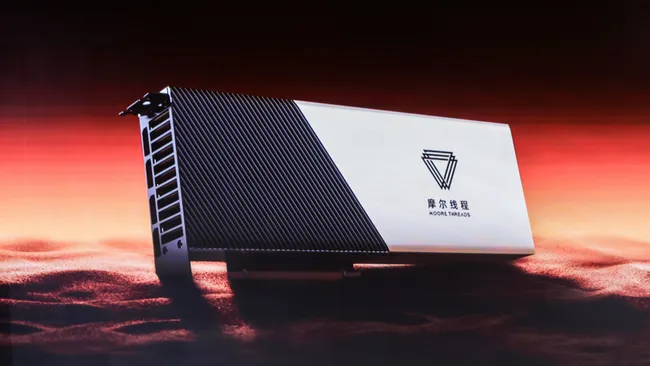
(Image credit: Moore Threads)
The AI and computing landscape is undergoing a monumental transformation, largely thanks to Moore Threads' introduction of the MTT S4000 AI GPU.
This groundbreaking graphics card, a product of the Chinese GPU manufacturer Moore Threads, is precisely engineered to meet the growing demands of AI and data center operations. The MTT S4000 stands out for its impressive technical specifications and strategic collaboration with Lenovo. This move promises to redefine AI hardware's future and potentially help break NVIDIA's chokehold on the market.
Unveiling the Monster Inside the MTT S4000
The MTT S4000 GPU (Chinese source, we used machine translation) emerges as a powerhouse in compute performance. It boasts 25 TFLOPs of FP32, 50 TFLOPs of TF32, 100 TFLOPs of FP16/BF16, and 200 TOPS on INT8 performance.
Remarkably versatile, it goes beyond being just an AI accelerator card. The GPU supports four display outputs, handling up to 8K displays and managing 96 simultaneous 1080p streams.
What's more impressive is its advancement over the previous generation. The MTT S4000 offers a significant boost in memory and computing capabilities compared to the MTT S3000, marking a 50% increase in memory capacity and a 64% rise in FP32 computing capabilities.
Moore Threads and Lenovo
The collaboration between Moore Threads and Lenovo marks a significant stride in AI and data center workloads.
The heart of this collaboration is the KUAE Intelligent Computing Center, which integrates advanced hardware with sophisticated software solutions.
Equipped with MCCX D800 GPU servers, each loaded with eight MTT S4000 GPUs, the center is designed to support the leading AI models and frameworks, ensuring seamless compatibility with NVIDIA's CUDA ecosystem.
This alliance has generated considerable excitement within the tech community. It positions the MTT S4000 as a formidable competitor in the AI hardware market, signaling a potential shift in industry dynamics.
Performance Concerns
One of the primary concerns regarding the MTT S4000 is its actual performance. The brand's earlier models reportedly failed to meet expectations, raising questions about the real-world effectiveness of the MTT S4000.
Despite the promising specifications announced by Moore Threads, there remains a degree of skepticism in the tech community about whether this new model can deliver on its promises.
Technical Specs and Cooling
Another aspect that warrants attention is the need for more detailed information about the arrangement of the GPU's architecture, particularly regarding its 3rd-generation MUSA architecture.
The impact of this architecture on the overall performance and efficiency of the GPU remains unclear. Additionally, while the GPU features a dual-slot format and passive cooling system, the effectiveness of this cooling solution in real-world, high-intensity AI applications has yet to be extensively evaluated.
Market Positioning and Pricing
The positioning of the MTT S4000 in the global market is another factor to consider. The GPU's success depends on its technical prowess and how it is received and adopted by industries and AI developers worldwide. Furthermore, the retail price of the MTT S4000 has yet to be disclosed, and its affordability will be a crucial factor in determining its competitiveness against established players like NVIDIA and AMD.
This Is Just the Beginning
The introduction of the Moore Threads MTT S4000 AI GPU and its strategic collaboration with Lenovo marks a critical juncture in the AI hardware industry.
Given the political climate and recent moves to block companies like NVIDIA from selling certain AI-capable GPUs in China, it’s unclear whether we’ll ever get the chance to get our hands on any of these cards at Titan, but we do know that we need a true competitor against NVIDIA in the AI space if we want even more affordable workstations tackling modern AI workloads.